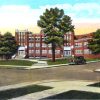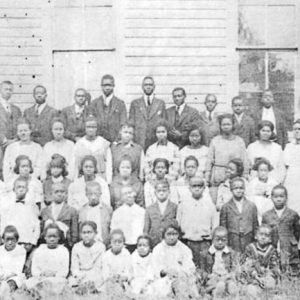calsfoundation@cals.org
Wynne Normal and Industrial Institute
The Wynne Normal and Industrial Institute was a private primary and secondary school for African Americans founded in Wynne (Cross County) in 1901 by the Reverend W. F. Lovelace, DD, who served as the school’s principal. The school operated until 1924.
Born in Lauderdale County, Tennessee, in 1862, Lovelace was a Baptist minister and educator who moved to Wynne in 1887 to pastor First Baptist Church. When he arrived in Wynne, the Cross County schools had 1,424 white students and 860 black students. In 1888, Lovelace became principal of Wynne’s public school for black students and remained in the position until 1894.
In 1896, Lovelace was named principal of black schools in Stuttgart (Arkansas County). He was later asked to return to his former position in Wynne schools. After returning to Wynne, he founded the Normal School located in what is presently the area of West L’Anguille Street and O Street. Lovelace continued to run the school until it came under control of the North Arkansas Baptist District Association, at which point he became secretary of the institute.
According to a 1912 report by the U.S. Office of Education, the Normal School covered twelve grades. It had three teachers and 132 students. There were sixty-four elementary students in addition to sixty-eight middle grade and high school students. The majority of the students were female, with forty female elementary students and forty-one female middle and high school students. At the time, schools for African Americans typically went through the eighth grade. As a result, the Normal School also boarded students from nearby towns.
The school’s main building was a two-story frame structure with sixteen rooms. The top floor was dormitory space for out-of-town students. Adjacent to the classroom building was the male dormitory. Instruction went beyond the courses taught at the public school. Students who paid $2.50 per month in tuition also received lessons in cooking and sewing. Lovelace provided ministerial preparation for some male students.
Financials for the 1912–13 school year included income of $1,500, with $1,000 from the North Arkansas Baptist District Association, $350 from tuition, and $150 in donations. Salaries accounted for $1,000, with $500 for what the report referred to as “other purposes.” The school was valued at $3,000, including a two-story frame building on about twenty acres. In 1914, when the institute was visited by representatives from the U.S. Bureau of Education for its study of “private and higher schools for colored people in the United States,” enrollment had decreased to 114 students total: 108 elementary and six secondary. The Bureau of Education’s recommendation for the Normal School was that it “be moved to some other part of Arkansas or combined with one of the larger Baptist schools of the state.”
In addition to church support and tuition, a Normal School alumna remembered support from a group called the Northeast Arkansas Association of Farmers. Normal School graduate Bessie Lockhart of Wynne said in a 1980 newspaper interview that, in 1924, farm crops were not good, and it became difficult for the farmers to continue to finance the school. The Normal School closed in 1924. It burned soon after; that same year, fire also destroyed the public school for black students in Wynne.
For additional information:
Hicks, Anthony. “A History of Ward Four.” 2 parts. Wynne Progress, February 13 and February 20, 1980.
Negro Education: A Study of Private and Higher Schools for Colored People in the United States. Department of the Interior, Bureau of Education Bulletin No. 39. Washington DC: Government Printing Office, 1917. Online at http://www.archive.org/details/negroeducation00fundgoog (accessed February 5, 2024).
Report of the Commissioner of Education for the Year Ended June 30, 1912. Vol. 2. Washington DC: Government Printing Office, 1913.
Who’s Who among the Colored Baptists of the United States. Kansas City, MO: Franklin Hudson Publishing Co., 1913.
Anthony Hicks
Memphis, Tennessee







Comments
No comments on this entry yet.